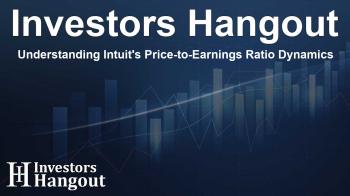Understanding Intuit's Price-to-Earnings Ratio Dynamics

Intuit Inc. Stock Overview
In today's market, Intuit Inc. (NASDAQ: INTU) is experiencing a share price of $656.71, reflecting a slight increase of 0.10%. Over the last month, the stock has seen a decline of 3.69%, but an increase of 5.62% over the past year suggests that there's more to explore regarding its performance. Investors may be curious to evaluate whether this stock is overvalued or if it's a potential buying opportunity due to its current status.
Understanding the P/E Ratio
What is the P/E Ratio?
The price-to-earnings (P/E) ratio is a crucial metric used by investors to assess a company’s market performance relative to its earnings. A lower P/E ratio might hint that the market does not have high growth expectations for the stock. Conversely, it could also indicate that the stock is undervalued compared to its peers.
Intuit's P/E Ratio Compared to Peers
Intuit’s P/E ratio is currently lower than the average P/E ratio of 126.29 in the Software industry. This fact might lead to two possible interpretations: either Intuit is likely to underperform compared to its competitors, or the stock might simply be undervalued based on current earnings.
Implications of a Low P/E Ratio
While a low P/E ratio can indicate undervaluation, it may also signify weaker growth prospects or financial instability for Intuit. It’s vital for investors to use the P/E ratio alongside various other metrics to paint a complete picture of a company’s financial health.
Integrating Comprehensive Analysis
It's important to recognize that analyzing a company solely based on its P/E ratio could lead to misleading conclusions. Investors should combine this metric with other financial ratios and trends within the industry. This comprehensive approach aids in understanding the broader economic factors that may affect Intuit's market position.
Key Takeaways for Investors
Investors interested in Intuit should not only consider the current P/E ratio but also explore the future growth potential and overall market trends relating to the software industry. Engaging with a full spectrum of financial data allows for wiser investment choices that suit long-term financial goals.
Frequently Asked Questions
What does the P/E ratio indicate?
The P/E ratio shows how much investors are willing to pay for a company's earnings. A higher number can imply growth expectations, while a lower number might suggest undervaluation or caution about the stock's future.
How does Intuit's performance compare year over year?
Intuit's share price has increased by 5.62% over the last year, which indicates responsiveness to market conditions despite recent fluctuations.
Why is a lower P/E ratio sometimes better?
A lower P/E ratio can indicate the stock is undervalued compared to earnings, presenting potential buying opportunities for savvy investors.
What should investors analyze alongside the P/E ratio?
Other key metrics, industry trends, and qualitative aspects of the business should be analyzed in tandem with the P/E ratio for a more rounded perspective.
Is Intuit a good long-term investment?
This depends on various financial indicators and market conditions. Investors should conduct thorough research before making any decisions regarding long-term investments in Intuit.
About The Author
Contact Thomas Cooper privately here. Or send an email with ATTN: Thomas Cooper as the subject to contact@investorshangout.com.
About Investors Hangout
Investors Hangout is a leading online stock forum for financial discussion and learning, offering a wide range of free tools and resources. It draws in traders of all levels, who exchange market knowledge, investigate trading tactics, and keep an eye on industry developments in real time. Featuring financial articles, stock message boards, quotes, charts, company profiles, and live news updates. Through cooperative learning and a wealth of informational resources, it helps users from novices creating their first portfolios to experts honing their techniques. Join Investors Hangout today: https://investorshangout.com/
The content of this article is based on factual, publicly available information and does not represent legal, financial, or investment advice. Investors Hangout does not offer financial advice, and the author is not a licensed financial advisor. Consult a qualified advisor before making any financial or investment decisions based on this article. This article should not be considered advice to purchase, sell, or hold any securities or other investments. If any of the material provided here is inaccurate, please contact us for corrections.

